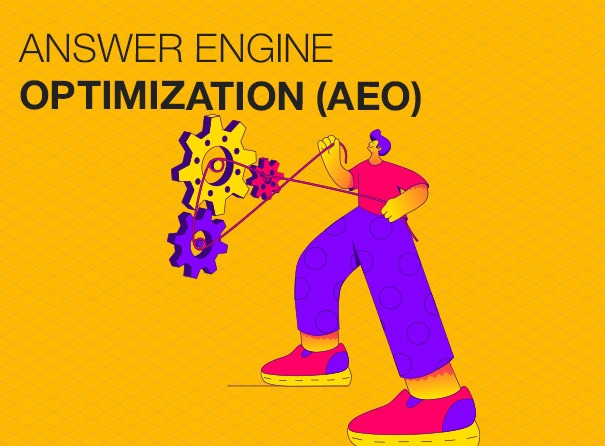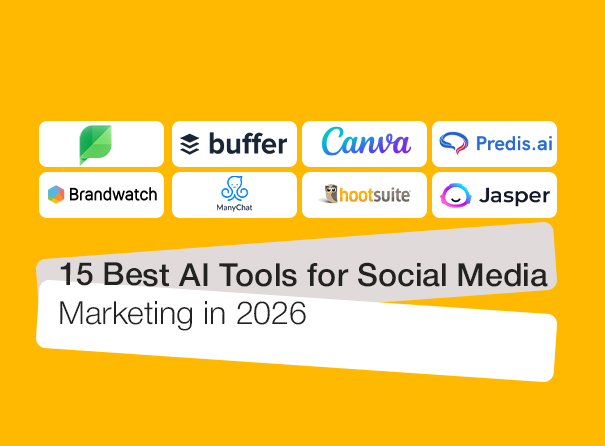TL; DR: - In 2025, search is no longer a matter of scrolling through infinite blue links—it's about having immediate, AI-generated answers. That’s where Answer Engine Optimization (AEO) comes in. While the goal of traditional SEO is to rank a web page, AEO works to make sure your content is well-structured, conversational, and authoritative enough to be showcased in AI Overviews, voice assistants (Siri, Alexa, Google Assistant), and chatbots (ChatGPT or Bing Copilot). For businesses, AEO is about seizing Position Zero, crafting content for zero-click queries, and establishing trust by being ‘the answer’ AI platforms select. From schema markup and FAQs to conversational content and refreshing pages with credible sources, AEO is today an essential SEO strategy. Companies that adopt AEO now will own search visibility in the age of AI-powered searches.
Introduction
Let's be real: search is no longer what it once was. People don't want to scroll through rows of blue links anymore to discover answers. Rather, they anticipate immediate, precise, and conversational answers. That change has led to Answer Engine Optimization (AEO) - the next-generation SEO that makes your content searchable in the era of AI-powered search. Here at Inqnest, we've witnessed how American brands that jump on AEO early can capture attention on Google's AI Overviews, Bing's Copilot, and even voice assistants Siri and Alexa. AEO is about preparing your content, so that when AI systems summarize, suggest, or "speak back" an answer, your brand gets mentioned. If your company wants to own tomorrow's search, our Search Engine Optimization services are designed to take you there.
What is Answer Engine Optimization (AEO)?
Answer Engine Optimization refers to organizing content in a manner that can be extracted and highlighted by AI-based platforms as the best possible solution. Rather than being concerned with ranking on Google's top 10 alone, AEO is more about claiming the "Position Zero" position or becoming the default voice response.
Here's a quick example: Suppose someone asks Google Assistant, "What is the healthiest fast-food meal?" Rather than presenting several links, the assistant provides Chipotle's burrito bowl taken from an excerpt within a health blog. That's AEO - content designed for AI to locate and provide instantly.
Overview of Google AI Usage in Search
Google has made it official: the future of search is AI. Its AI Overviews, launched extensively in 2024 and phased in in the U.S., now show up on millions of searches. The summaries combine information from several sources and present it right at the very top of the page of results.
For example, if you ask, "Is it safe to drink coffee every day?", you don't get links alone — you receive an AI-written summary of the agreement, frequently with quotes from Mayo Clinic or WebMD. That's the new world: AI determines what sources to promote, rather than search algorithms that rank links.
Other factors determining AEO possibilities include:
- Featured snippets: Brief answers taken directly from sites.
- People Also Ask (PAA) boxes: Follow-up questions broadening user interaction.
- Knowledge panels: Brand, person, or topic summaries.
The catch? Only organized, clear, and authoritative content gets published in these AI-created sections.
Why AEO Matters in the Future of SEO
Traditional SEO isn't dead yet, but it's not sufficient all by itself anymore. Here's why AEO is more essential than ever:
- Zero-click searches are on the rise. In March 2025, almost 27% of U.S. searches concluded without users clicking on a single link. But brands showcased in AI snippets still received visibility.
- Voice search is the norm now. Approximately 20% of American adults operate smart speakers like Alexa or Google Nest on a daily basis. That's millions of questions answered without a screen- only brief, conversational AEO content can cut it.
- Trust equals traffic. When AI regularly draws answers from your website, such as how Mayo Clinic has the upper hand for health questions, your brand gets the authority and recognition even without explicit clicks.
The future of SEO is all about striking a balance between visibility and trust: having your content selected as ‘the answer’ on multiple AI-based platforms.
AEO vs Traditional SEO: What's the Difference?
hough both SEO and AEO strive to maximize visibility, the path to getting there is very different. Traditional SEO is built on ranking for keywords and generating clicks, typically through lengthy, keyword-heavy content that battles for a position among the traditional "10 blue links." AEO, however, is constructed on providing instant, AI-optimized answers that can be picked up by Google AI Overviews, Siri, or Alexa. Instead of broad or long-tail keywords, AEO relies on question-based, intent-driven phrases, with content written in a concise, structured, and conversational style.
For example, while a fitness brand would use SEO to get ranked for "best HIIT workouts," AEO would take it to the next level by creating direct responses to questions such as "What is the best 20-minute HIIT workout?" making the content snippet-ready for answer engines.
Types of Answer Engines and How to Optimize
Answer engines are not created equal. Here's how to write for them:
1. AI-layer search engines (Google, Bing)
Use schema markup, FAQs, and brief content. Home Depot, for instance, employs schema to make its DIY guides display in featured snippets.
2. AI chatbots (ChatGPT, Perplexity, Bing Copilot)
These depend on current, structured, and authoritative content. SaaS brands publishing guides with solid citations stand a much better chance of being suggested.
3. Voice assistants (Alexa, Siri, Google Assistant)
They prefer natural, conversational responses. Domino's crafted queries such as "How do I order pizza with Alexa?" so that Alexa actually speaks their brand.
Want to learn more? Read this blog on answer engines as a Google alternative that details how emerging players in the search landscape are redefining the way users find information.
What Makes AEO Challenging
If AEO was simple, everyone would be doing it. The truth? It is challenging:
- Traffic vs visibility dilemma. Even if you win snippets, not every user clicks through.
- Persistent AI updates. Google's AI Overviews change constantly and optimizing them consistently becomes difficult.
- Content control. AI may pick and choose only a portion of your answer, and if not phrased carefully, it can mislead your content.
- There is intense competition. Everyone wishes to be Position Zero. The brands with clear content structuring and authority succeed most of the time.
Imagine trying to fight over a lone microphone in a busy room- only the clearest, most authoritative voices are heard.
Best Practices for AEO Optimization
So how do you optimize for answer engines? Here are tried-and-tested methods:
- Lead with the answer. Place the brief answer first — then elaborate. Airbnb does this beautifully by beginning its help articles with one-line definitions prior to exploring more in-depth.
- Use schema markup. FAQPage, HowTo, and Product schema assist search engines in understanding your content.
- Prioritize conversational content. Think voice-first: "How do I repair a leaky faucet?" instead of "Leaky faucet repair solutions."
- Revise and cite sources. AI prefers up-to-date, reliable content. Healthline refreshes stale blogs every year to continue winning snippets.
- Mobile + speed optimization. Since most voice queries occur on mobile, slow pages won't be chosen.
AEO Optimization Tools to Use
No blind guessing necessary — these tools assist with simplifying AEO:
- AnswerThePublic — discover the very questions users are searching for.
- AlsoAsked — find out related conversational questions.
- SEMrush & Ahrefs — monitor featured snippet performance.
- Schema generators — implement structured data without coding.
- Google PageSpeed Insights — maintain your site's speed and mobile-friendliness.
Collectively, these tools make it simpler for brands to appear in answer-centric search results reliably.
Why is AEO Critical Now?
AEO is not a "someday" strategy — it's a right now requirement. With AI Overviews currently live in the U.S., brands that do not respond risk losing out on relevance and authority.
Consider it:
- If you're a healthcare provider, would you want patients to get answers from you or from a rival clinic?
- If you're a retailer, do you want Alexa to recommend your product- or your competitor's?
- If you're a SaaS company, do you want Copilot to suggest your tool- or keep you invisible?
The companies that act quickly on AEO will shape how their industries appear in AI-powered search for the next decade.
For a deeper dive, see this blog on answer engines vs search engines and how the differ from each other.
Conclusion
SEO is no longer just ranking up. It's about being the answer AI trusts. Traditional SEO continues to develop authority and reach, but Answer Engine Optimization (AEO) is what places your brand center stage in AI Overviews, voice responses, and snippets.
At Inqnest, we assist brands in merging SEO depth with AEO precision to claim visibility in this changing environment. Companies that move now will be the ones building consumer trust tomorrow.
Ready to claim Position Zero? Partner with Inqnest and let's ensure your brand is the one AI chooses first.
FAQs
1. What is Answer Engine Optimization (AEO)?
AEO is the practice of structuring and refining content in such a way that AI search engines, chatbots, and voice assistants choose it as the best answer. As opposed to SEO, which gets your pages ranked, AEO positions your brand at Position Zero in AI Overviews, snippets, and zero-click searches.
2. In what ways is AEO different from traditional SEO?
- SEO = Ranks for keywords and brings organic traffic.
- AEO = Intent-led, conversational content easily extractable by AI to surface as the answer.
3. Why is AEO relevant in 2025?
With zero-click and voice search dominating, users no longer always click through to websites. Brands require AEO to remain top of mind in AI-driven search results and establish trust as an authoritative source.
4. What are the best practices for AEO?
- Lead with answer-first, concise content.
- Apply schema markup (FAQ, HowTo, Product).
- Use a voice-friendly, conversational tone.
- Maintain fresh, up-to-date content with authoritative sources.
- Mobile and site speed optimization.
5. What tools can help with AEO optimization?
Tools such as AnswerThePublic, AlsoAsked, SEMrush, Ahrefs, schema generators, and Google PageSpeed Insights assist in detecting user questions, tracking snippets, and enhancing technical SEO for AI-friendly content.
6. Is SEO still relevant if AEO is the future?
Yes. SEO creates long-term authority and visibility, whereas AEO provides immediate visibility in AI-based responses. SEO and AEO constitute the future-proof strategy for marketers in 2025.











.png)









.jpg)


.png)
.png)
.png)

.png)
